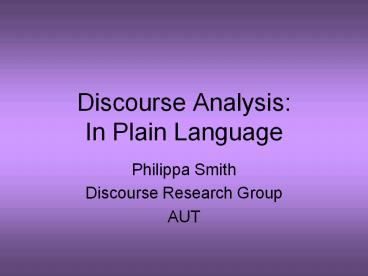Discourse Analysis: In Plain Language - PowerPoint PPT Presentation
1 / 17
Title:
Discourse Analysis: In Plain Language
Description:
Discourse Analysis: In Plain Language ... It is helpful to distinguish two main senses. ... Unravelling the web of discourse analysis in Media Studies: Key issues and ... – PowerPoint PPT presentation
Number of Views:196
Avg rating:3.0/5.0
Title: Discourse Analysis: In Plain Language
1
Discourse AnalysisIn Plain Language
- Philippa Smith
- Discourse Research Group
- AUT
2
Fasold, R. (1990)
- The study of discourse is the study of any
aspect of language use.
3
Du Gay, P. (1996)
- Discourse is a group of statements which
provide a language for talking about a topic and
a way of producing a particular kind of knowledge
about a topic. Thus the term refers both to the
production of knowledge through language and
representations and the way that knowledge is
institutionalized, shaping social practices and
setting new practices into play.
4
Fairclough, N. (1995)
- The term discourse is widely and
sometimes confusingly used in various
disciplines. It is helpful to distinguish two
main senses. One is predominant in language
studies discourse as social action and
interaction, people interacting together in real
social situations. The other is predominant in
post-structuralist social theory Foucaulta
discourse as a social construction of reality, a
form of knowledge.
5
Smith and Bell, 2007
- Discourse analysis involves a close
examination of text, including visual imagery and
sound as well as spoken or written language. It
is concerned with both the form of the text and
its use in social context, its construction,
distribution and reception. It aims to understand
and elucidate the meanings and social
significance of the text.
6
Phillips and Hardy (2002)
- Without discourse, there is no social
reality, and without understanding discourse, we
cannot understand our reality, our experience or
ourselves.
7
Stubbe, M. et al. (2003)
- Multiple discourse analyses of a workplace
interaction. - Discourse Studies. 5 (3) 351-389.
8
British Columbia Whale Watching Industryexample
one from Phillips, N. Hardy, C. (2002).
- Business study of whale watching industry
- Identified actors
- Collected data
- Findings
- Outcomes
9
Actors
- 1. Main - commercial whale watchers
- researchers
- Lesser - amateur whale watchers
- seaplane companies
- ferry companies
- fishing boat companies
- Regulators - Govt. British Columbia
- Coastguards
- Travel tourism boards assoc
10
Data collection
- 17 tape recorded, semi-structured i/views
- key actors (1995-96)
- Textual materials - brochures, books etc
- Scholarly texts
- Internet Movie Database
- Microsoft Cinemania CD-ROM
- Film oriented Internet newsgroups
- Personal communications
- Movies - Moby Dick to Free Willy
11
Findings
- Concept of whales changed from dangerous monsters
to intelligent individuals - Resulted through complex processes of multiple
discourses - This provided a space within which institutional
entrepreneurs worked to influence the field
12
Outcomes of research
- Broader, more contextualised understanding of
collaboration (discursive activity) - Developed framework based on a discursive
approach to explain dynamics of collaboration - Understand how collaboration can be managed
13
Example 2 from Tuffin, K., Praat, A. Frewin,
K. (2004)New Zealand Journal of Psychology, Vol
33, No. 2.
- Analysing a Silent Discourse
- Sovereignty and tino
- rangatiratanga in Aotearoa
14
Points of interest
- Social psychology of race relations
- Discursively analyses construction of sovereignty
from focus group - Offers alternative to dominant discourses
surrounding nationhood - Illustrates how oppressive race talk can be
challenged
15
Extract 1 Whats your understanding of
sovereignty?
- Gareth That ((pause)) what were really talking
about constantly is tino rangatiratanga. I mean
thats the safe basis to go back to because
thats what the Treaty actually says. Um
sovereignty is a translation of that, and its a
translation which ah has been one that Maori have
used, probably without thinking very much about
it because it was clearly the word that ah
Britain was using ((pause)) and more recently the
Settler Government ((pause))
16
Extract 2
- GarethWe could get into much more detail than
that. um - I think for instance that this country
has suffered. Ah from picking up a notion of
sovereigntyof national sovereignty based on the
way that Britain saw it, and still to some extent
sees it. In one narrow window of her history mm
ah and its a very unusual meaning and its a
meaning that says sovereignty is a single thing
and its concentrated and exercised only in one
place mm and most of the states in the world that
Im aware of dont operate that way.
17
References
- Du Gay, P. (1996). Consumption and identity at
work London Sage Publications. - Fairclough, N. (1995). Media Discourse. London
Edward Arnold. - Fasold, R. (1990). Sociolinguistics of Language.
Oxford Blackwells. - Phillips, N. Hardy, C. (2002). Discourse
analysis Investigating processes of social
construction. Thousand Oaks, CA Sage
Publications. - Smith, P. Bell, A. (2007).Unravelling the web
of discourse analysis in Media Studies Key
issues and debates. Eoin Devereux (ed). London
Sage Publications.































